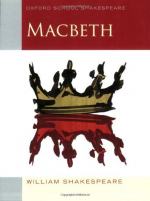|
This section contains 10,341 words (approx. 35 pages at 300 words per page) |

|
SOURCE: Foster, Donald W. “Macbeth's War on Time.” English Literary Renaissance 16, no. 2 (Spring 1986): 319-42.
In the following essay, Foster contends that Macbeth is a slave of time, a man who questions whether his fate is predetermined yet whose boundless will to power leads him to seize the future on his own terms and create himself king. However, the critic proposes, Macbeth's failure to transcend the inexorable progress of time, his most pernicious enemy, ultimately leads him to a nihilistic conviction that his life—indeed all life—is meaningless.
James I, in his preface to the Basilikon Doron (1603), notes that men must “be very warie in all their secretest actions, and whatsoeuer middesses they vse for attaining to their most wished ends.” This is especially true, he says, in the affairs of kings:
for Kings being publike persons, by reason of their office and authority, are as it...
|
This section contains 10,341 words (approx. 35 pages at 300 words per page) |

|


